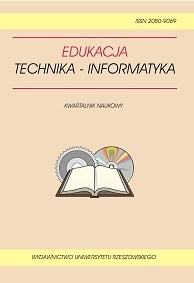Práce s chybou žáků ve výuce přírodních věd
DOI:
https://doi.org/10.15584/eti.2017.3.6Słowa kluczowe:
výuka, uĉení, ņák, uĉitel, chyba, chyba ve výuce, koncept nesouladu, kognitivní nerovnováhaAbstrakt
People make mistakes since they are born. After all, when a baby learns to walk, it is bound to make a number of attempts which end up in a fall, i.e. an erroneous movement. As the saying goes, we learn from our mistakes. However, in the compulsory education the error is quantified into the form of evaluation and marking, and pupils gradually start to think that making errors is wrong, undesirable and that it is necessary to avoid such behaviour at all costs. Making errors in any type of learning is, however, natural; it is inseparable from learning and even regarded by some experts as one of the phases of problem-solving. Considering the issue of making errors from this perspective, it should be stated that the objective of a teacher is to teach pupils how to learn from their errors and use them in further learning and in life generally. This paper aims to show how science teachers at primary schools perceive pupils‟ errors. Using questionnaires we investi-gated whether, and how, teachers distinguish the seriousness of their pupils‟ errors in the process of solving tasks, whether they are able to accept pupils‟ errors at class and teach them how to use the errors effectively.Pobrania
Opublikowane
2017-09-30
Jak cytować
MALĈÍK, M., & MIKLOŠÍKOVÁ, M. (2017). Práce s chybou žáků ve výuce přírodních věd. Journal of Education, Technology and Computer Science, 21(3), 48–55. https://doi.org/10.15584/eti.2017.3.6
Numer
Dział
PROBLEMY EDUKACJI OGÓLNEJ I ŚRODOWISKOWEJ
Licencja
Prawa autorskie (c) 2017 Journal of Education, Technology and Computer Science

Utwór dostępny jest na licencji Creative Commons Uznanie autorstwa – Na tych samych warunkach 4.0 Miedzynarodowe.

